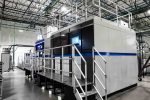Hyliion Scales KARNO Generator Production with Colibrium Additives M Line System
Hyliion Holdings Corp., a developer of sustainable electricity-producing technology, has installed its first M Line additive manufacturing system from Colibrium Additive, a GE Aerospace company. Hyliion, known for creating distributed power generators, will use this system to scale production of its KARNO generator technology. This installation marks the first U.S. deployment of the advanced M Line platform.The developer of sustainable energy anticipates that the M Line machine will increase output of precision parts by two to four times compared to previous 3D printing setups. The ability to produce complex geometries required for the KARNO linear generator relies on advanced additive manufacturing methods. Colibrium Additive, a supplier of 3D printers, metal powders, and industrial-scale manufacturing services, designed the M Line with a modular approach that separates laser processing from material handling. This design streamlines production and reduces downtime, optimizing manufacturing processes.Colibrium Additive M Line 3D Printer. Photo via Hyliion.Thomas Healy, Founder and CEO of Hyliion, explained, The M Line systems are a pivotal advancement in our journey to scale manufacturing. By incorporating this state-of-the-art technology into our process, we are significantly enhancing our capacity to meet growing demand for KARNO generators. Hyliion has ordered additional M Line machines, with deliveries set to continue throughout 2025.Chris Schuppe, CTO of Colibrium Additive, stated, Our M Line technology, with its modular design, aims to streamline operations, reduce production times, and optimize manufacturing processes. It is an optimal choice for producing the complex parts required in full-scale production of the KARNO generator. This emphasis on efficiency is crucial for producing the intricate components that underpin the KARNO generators performance.3D Printing in the Energy SectorIn Saudi Arabia, the National Additive Manufacturing & Innovation (NAMI) Companya joint venture between 3D Systems and Saudi Arabian Industrial Investments Company Dussurhas purchased new metal and polymer 3D printers. These include systems optimized for precise production of end-use parts, such as metal DMP Factory 500, DMP Flex 350 Dual, and polymer SLS 380 printers. NAMI will use these to produce parts for the Saudi Electricity Company, creating a localized supply chain. The initiative includes developing a digital inventory of parts to reduce production time, storage requirements, and costs, directly impacting efficiency for energy infrastructure.Elsewhere, Upwing Energy, a natural gas service provider, has integrated Velo3Ds laser powder bed fusion technology to manufacture its Subsurface Compressor System compressor module. This approach reduced the production lead time for a full compressor rotor assembly to 10 weeks. Upwing produces high-quality Inconel 718 parts with complex geometries necessary for its gas compression processes. Rigorous testing, including rotational speeds exceeding 55,000 RPM and spin-to-burst tests, confirmed that 3D printed parts meet ASTM standards and perform reliably under extreme conditions.NAMI facilities in Saudi Arabia. Photo via NAMI.Ready to discover who won the 20243D Printing Industry Awards?What will the future of 3D printing look like?Which recent trends are driving the 3D printing industry, as highlighted by experts?Subscribe to the 3D Printing Industry newsletter to stay updated with the latest news and insights.Stay connected with the latest in 3D printing by following us on Twitter and Facebook, and dont forget to subscribe to the 3D Printing Industry YouTube channel for more exclusive content.Featured image shows Colibrium Additive M Line 3D Printer. Photo via Hyliion.


